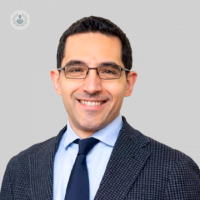Surgical treatment for thoracic endometriosis: what should you know?
Written in association with:Thoracic endometriosis is a rare but significant condition where tissue similar to the lining of the uterus (called endometrial tissue) grows within the chest cavity. This can lead to symptoms such as chest pain, coughing up blood during menstruation, or shortness of breath. For many patients, surgery offers a pathway to relief, particularly when other treatments, such as medication, have been ineffective.
Leading consultant cardiothoracic surgeon Mr Andrea Billie explores common questions about surgical treatment for thoracic endometriosis to help you make informed decisions.

What is thoracic endometriosis and how is it diagnosed?
Thoracic endometriosis occurs when endometrial tissue grows on or around the lungs, diaphragm (the muscle under the lungs that helps with breathing), or chest wall. These tissues respond to hormonal changes, often worsening symptoms during menstruation. Diagnosing thoracic endometriosis can be challenging, as its symptoms overlap with other conditions, such as respiratory or cardiac issues.
Your doctor may use imaging tests such as MRI or CT scans to look for signs of the condition. In some cases, confirmation requires surgery, such as thoracoscopy (a minimally invasive procedure using a camera to view inside the chest), which allows for both diagnosis and treatment.
When is surgery considered as a treatment option?
Surgery is usually considered when symptoms significantly affect your quality of life or do not improve with medical treatments like hormonal therapies. It is also recommended if the condition causes complications, such as a collapsed lung or persistent bleeding.
Surgical treatment aims to remove the endometrial tissue and repair any damage it may have caused. Discussing your medical history, symptoms, and treatment goals with your doctor will help determine whether surgery is the right choice for you.
What happens during surgical treatment?
Surgical treatment for thoracic endometriosis often involves a procedure called video-assisted thoracoscopic surgery (VATS). This is a minimally invasive approach in which a small camera and instruments are inserted into the chest through tiny incisions. The surgeon locates and removes the endometrial tissue, a process called excision.
In some cases, additional procedures may be required. For example, if the diaphragm is affected, your surgeon may repair any damage or remove part of the affected tissue. The specific steps depend on the extent and location of the disease.
To ensure the most effective and patient-friendly outcomes, I perform endometriosis surgeries robotically. Robotic-assisted surgery is a groundbreaking technique that allows me to be more precise and radical in excising endometriosis from delicate and hard-to-reach areas like the diaphragm and pleura. This approach not only increases the chances of completely removing the disease but also reduces complications, minimises blood loss, and promotes faster recovery compared to traditional methods.
What is recovery like after surgery?
Recovery after VATS surgery is generally faster and less painful than traditional open surgery. Most patients can return home within a few days and resume normal activities within a few weeks. However, recovery times may vary depending on the severity of the disease and the extent of the surgery.
You may experience mild discomfort in the chest, which can be managed with pain medication. Follow-up appointments with your surgeon are essential to monitor healing and address any concerns. It’s also common to combine surgery with hormonal treatments to prevent recurrence of endometrial tissue.
If you would like to book a consultation with Mr Billie, do not hesitate to do so by visiting his Top Doctors profile today.


